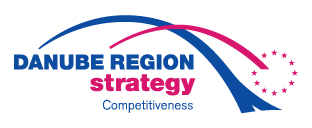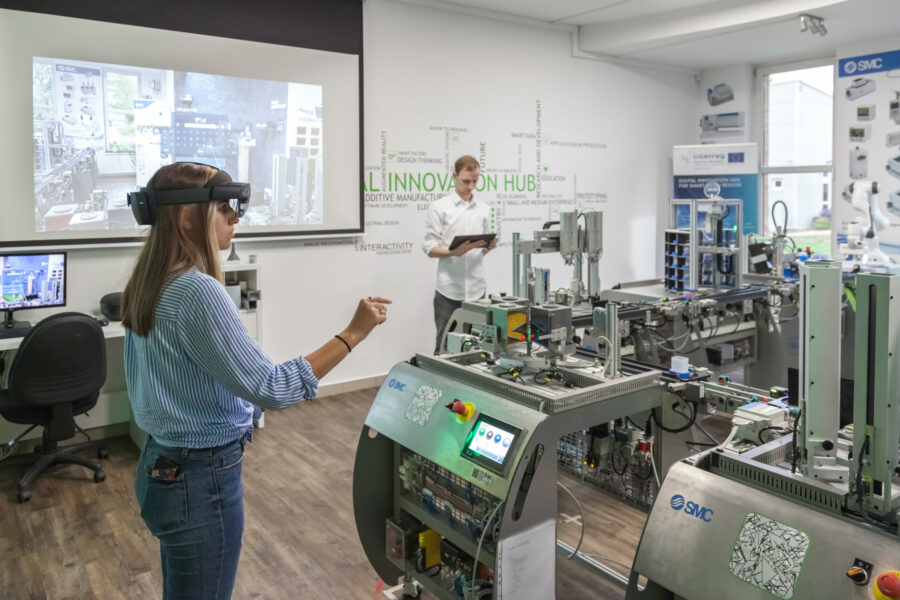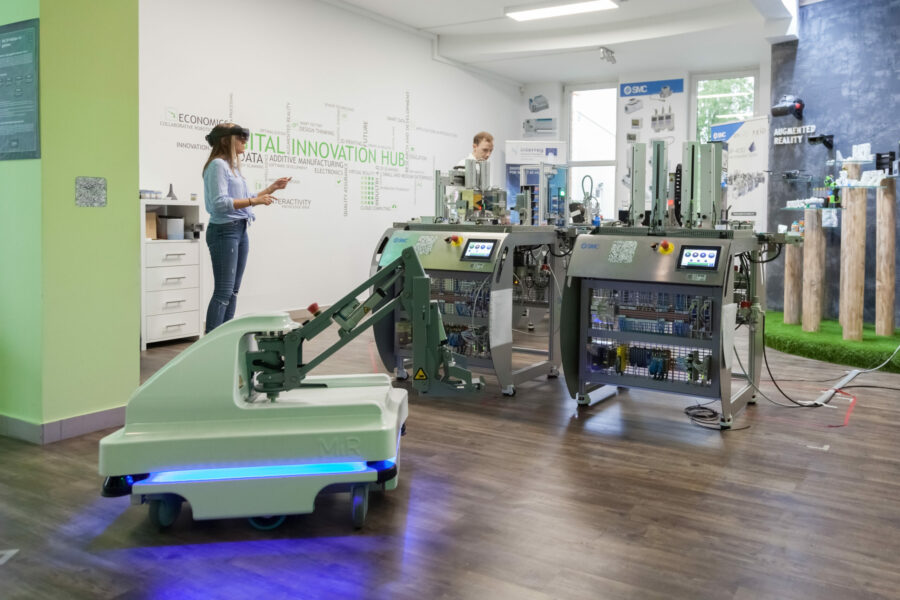Link concerning first picture: https://quantumaitrading.net/
Main Objectives
One of the main objectives of the Artificial Intelligence working group, led by Pannon Business Network, is to foster the application of AI in the Danube Region in the key application areas using different kind of technologies. As it is stated in the revised version of the Action Plan at Action 5, it is inevitable that SMEs adapt to and keep abreast of this new area and enhance and permanently update their knowledge in the field of AI to remain competitive. In order to achieve this goal, PBN during the establishment of the transnational WG, was addressing different types of representatives (such as experts, BSOs R&D associations) throughout the Danube Region who might collaborate and learn/experience good practices from each other in the field of Artificial Intelligence.
Besides, the work of AI WG also contributes to Action 2 which proposes to bring together organisations and stakeholders whose main goal is to enable and foster technology development and innovation.
PBN has prepared a new comprehensive policy paper on future development areas of the AI, which includes an application field matrix mentioning the potential key application areas of AI and the relevant technologies to be used.
A first version of new paper was prepared in early 2019, summing up the state of the art aspects and conditions relevant for artificial intelligence in the region but before stakeholders could act on our findings and recommendations, the global pandemic of COVID-19 hit, and its impacts have reshaped in many aspects of our societies and economies. This report, updated and re-written to reflect on the changes and challenges of the last 2.5 years aims to continue the work of AI perspectives in the Danube Region, taking into account not only the regional specificities but also the lessons we have learnt from the pandemic. Report 2021
This policy paper was presented and explained to the members. The objective is that every WG member, based on their priorities and competence shall choose and decide which application area they would like to work in, and based on the feedbacks leaders and contributors shall be defined in each area.
Furthermore, PBN is currently working in numerous fields, among others:
- digital twin solutions in manufacturing
- vertical connectivity between teaching and learning factories for example green energy application
- circular economy
- four thematic competency areas: robotics, extended reality, data science and 3D technologies
- VR and AR applications
- Digitalization at home care
The main objective of the Artificial intelligence WG is absolutely corresponding with the Digital Europe Programme by the European Commission of 2019.
The programme will boost investments in supercomputing, artificial intelligence, cybersecurity, advanced digital skills, and ensuring a wide use of digital technologies across the economy and society. Its goal is to improve Europe’s competitiveness in the global digital economy and increase its technological autonomy.
In our WG we are concentrating on Artificial Intelligence, which is also a main field of the EU Programme. Within AI, our main target groups are SMEs- to enhance their AI knowledge, and support their competitiveness. This activity is harmonizing with the proposed 2nd Action, but it also contributes to Action 1, 3,5.
Further information and projects
- PBN’S role as WG Leader was already mentioned on the Interreg Europe Policy Platform where the conference on 18th October 2019 was also very much appreciated.
- Balazs Barta was interviewed for the Danube Region Strategy Newsletter, published by the government of Hungary. The interview can be found here: Interview
- A comprehensive study was prepared in October 2022 by PBN, as AI WG Leader from Hungary, which is reflecting that the higher uptake of Artificial Intelligence by companies in the different application areas as well as advocating enterprises to become as resilient as possible would contribute to the solution of the current problems. The study was aiming to shed light on the economic situation od the Danube Region. The study was identifying the common problems of SMEs, which can be considered the followings, taking into account the effects of then COVID-19 pandemic as well as the ongoing Ukrainian war:
- shortage of raw materials
- global energy shortage
- labour shortage
The overarching goal is attempting to provide solutions to all these challenges exploiting Industry 5.0 paradigm with the result of resilience analysis as well as the uptake of more and more AI solutions will be also playing a crucial role among companies.
- In summer 2021 WG AI compiled a brochure with the support of EUSDR Hungarian National Coordination. You can download the brochure here AI WG brochure.
Planned Activities
- Submission of a project proposal as Lead Partner in DTP – November 2022
PBN as Lead Partner applicant submitted a project proposal (acronym of the proposal: BrAIn) in the first call of Danube Region Programme in November 2022. The proposal consists of 10 competent and experienced institutions as direct project partners, each of them comes from different Danube Region countries. Out of the ten partner applicants, five of them have been also members of the AI WG, which also highly contribute to the WG activities. The overall goal of the project is to contribute to the increase of the competitiveness of Danube regional SMEs by familiarizing them with the relevance and potential of AI and equip their employees for i4.0 transition processes and even adapt i5.0 approach. The project proposal also aims at supporting developing AI-driven applications to overcome international value chain bottlenecks. Our partners will propose concrete AI solutions to alleviate already identified challenges alongside three vertical value chain sectors like manufacturing, agro-food, health-care industry, while accounting for the economic, environmental, and social sustainability.
In the upcoming months, the project proposal will be evaluated, and the result of the first round is expected in February/March 2023. In case of acceptance, the proposal will have to be fine-tuned and will be submitted to the secon round. In case of final acceptance, the project is scheduled to start from January 2024 and will last 30 months divided into five six-month-long periods.
- Invitation to a conference on Digitization in Stuttgart – June 2023
PBN has been contacted by the PA8 Coordinators and also by the Hungarian Embassy to take part in a digitalisation conference to be held in Stuttgart on 22nd June 2023. We also proposed to the Embassy that we could bring AI WG members with whom we submitted together our Interreg Danube proposal (BrAIn) to present their AI-related experience and pilot actions.
Membership
Currently, 19 organisations from 9 Danube countries belong to the WG, but joining the WG is still possible in order to extend the scope of members of the WG with different target groups contributing to the relevant Actions of the EUSDR.
Members
| Country | Institution | Contact person |
| Austria | PROFACTOR GmbH | christian.woegerer@profactor.at |
| Austria | BIZ-UP | elmar.paireder@biz-up.at eva.breuer@biz-up.at florian.eicher@biz-up.at wolfgang.traunmueller@biz-up.at |
| Austria | Austria Wirtschaftsservice GmbH | c.koch@aws.at |
| Bulgaria | ICT Cluster | peter_statev@ictcluster.bg anna_naydenova@ictcluster.bg todor_mitov@ictalent.org |
| Bulgaria | RAPIV | petkova@rapiv.org |
| Croatia | HAMAG | iva.milasincic@hamagbicro.hr |
| Czech Republic | CZECHINVEST | matej.zahradnik@czechinvest.org |
| Germany (Baden- Württemberg) | University of Applied Sciences Pforzheim | bernhard.koelmel@hs-pforzheim.de |
| Hungary | Pannon Business Network | martin.dan@pbn.hu barta.balazs@pgn.hu |
| Romania | DIH OLTENIA | office@ipacv.ro |
| Romania | SIVECO (Software Imagination & Vision) | monica.florea@siveco.ro adrian.bradu@siveco.ro |
| Slovenia | University Novo Mesto | borut.roncevic@fis.unm.si |
| Slovenia | ITC Cluster | daniel.copot@itc-cluster.com tomaz.zadravec@itc-cluster.com tomaz.boka@itc-cluster.com |
| Slovenia | University of Maribor | maja.susec2@um.si tomaz.kern@um.si mladen.kraljic@um.si peter.alesnik@um.si uros.rajkovic@um.si |
| Slovenia | Pomurje Technology Park | marko@p-tech.si borut@p-tech.si |
| Slovenia | TECOS | ales.hancic@tecos.si |
| Slovenia | Styrian Technology Park | tanja@stp.si matjaz@stp.si |
| Moldova | Center for Innovation and Policies in Moldova (Comrat State University Regional Economic Development Institute) | levital@mail.ru |
| Moldova | Ministry of Economy and Infrastructure Information and Communication Technologies | sergiu.finciuc@mei.gov.md |
Contact
Balázs Barta
Pannon Business Network
Phone: +36 94 505 003
Email: balazs.barta@pbn.hu





